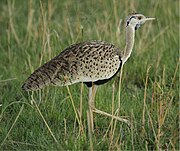Lissotis
Appearance
| Lissotis | |
|---|---|

| |
| Adult male Hartlaub's bustard (Lissotis hartlaubii) | |
| Scientific classification | |
| Domain: | Eukaryota |
| Kingdom: | Animalia |
| Phylum: | Chordata |
| Class: | Aves |
| Order: | Otidiformes |
| Family: | Otididae |
| Genus: | Lissotis Reichenbach, 1848 |
| Type species | |
| Otis melanogaster[1] Rüppell, 1835
| |
Lissotis is a genus of bird in the bustard family, Otididae. Some authorities, such as the IUCN, consider it part of Eupodotis; the separation adopted here follows the Handbook of the Birds of the World.[2]
Species
[edit]It contains the following species, both restricted to Africa:
| Common name | Scientific name and subspecies | Range | Size and ecology | IUCN status and estimated population |
|---|---|---|---|---|
| Black-bellied bustard | Lissotis melanogaster (Rüppell, 1835) Two subspecies
|
Sub-Saharan Africa
|
Size: Habitat: Diet: |
LC
|
| Hartlaub's bustard | Lissotis hartlaubii (Heuglin, 1863) |
Ethiopia, Kenya, Somalia, Sudan, Tanzania, and Uganda. | Size: Habitat: Diet: |
LC
|
References
[edit]- ^ "Otididae". aviansystematics.org. The Trust for Avian Systematics. Retrieved 2023-07-27.
- ^ Collar, Nigel (1996), "Family Otididae (Bustards)", in del Hoyo, Josep; Elliott, Andrew; Sargatal, Jordi (eds.), Handbook of the Birds of the World. Volume 3, Hoatzin to Auks, Barcelona: Lynx Edicions, pp. 240–273, ISBN 84-87334-20-2
- ^ "Lissotis melanogaster notophila (Black-bellied Bustard (notophila))". Avibase. 2003-06-24. Retrieved 2024-03-22.




